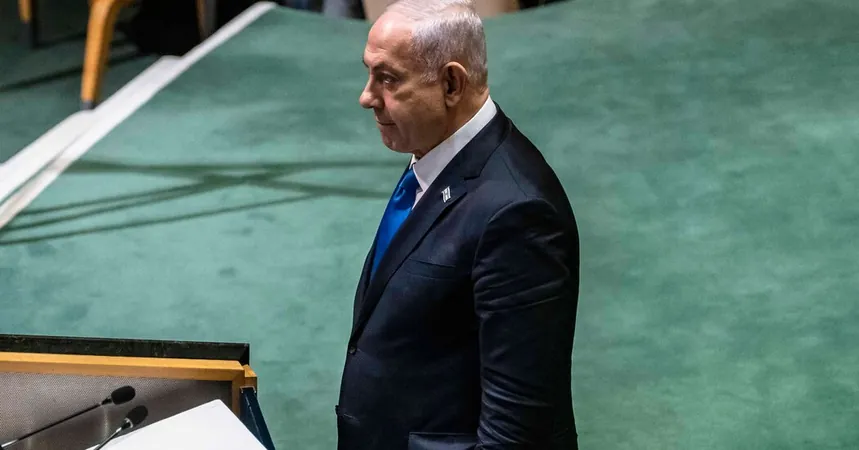
International Criminal Court Issues Arrest Warrants for Netanyahu Amid Gaza Crisis
2024-11-21
Author: Ming
In a groundbreaking decision that has sent shockwaves around the globe, the International Criminal Court (ICC) has issued arrest warrants for Israeli Prime Minister Benjamin Netanyahu and former Defense Minister Yoav Gallant. These extraordinary measures come in the wake of accusations that they used starvation as a weapon of war and intentionally targeted civilians during the ongoing conflict in Gaza.
The warrants, sought by the ICC's chief prosecutor back in May, have recently been made public, although the specific details of the accusations remain undisclosed. Netanyahu's office vehemently dismissed the charges, labeling them as 'absurd and false.' In a staunch declaration, they reiterated Israel's commitment to continue its military operations in Gaza to safeguard its citizens, asserting that the Prime Minister 'will not recoil or withdraw' until the objectives of the war are achieved.
The ramifications of this ruling are profound. Netanyahu now joins the ranks of other global leaders facing the ICC's scrutiny, including Russian President Vladimir Putin, who is wanted for war crimes related to the Ukraine invasion. Should Netanyahu travel to any of the 124 member states of the court, he faces potential arrest, a scenario complicated further by the fact that the United States is not an ICC member.
The announcement has been met with varied reactions globally. Hamas officials applauded the warrants against Israeli leaders, asserting that it represents a sliver of hope for the Palestinian cause, while Palestinians in Gaza expressed cautious optimism that the international community may finally hold their adversaries accountable.
As the conflict rages on, the situation in Gaza remains dire. The Gazan Health Ministry reports that over 44,000 Palestinians, including a heartbreaking number of children, have reportedly lost their lives since the onset of the war, a statistic that has drawn increasing global condemnation towards Israel's military actions. While Israel argues that its operations are compliant with international law, humanitarian groups have repeatedly highlighted the extensive suffering of the civilian population, citing severe shortages of food, water, and medical supplies exacerbated by Israel's blockade.
Critics within Israel itself have begun to question Netanyahu's policies. Families of hostages taken by Hamas have accused the Prime Minister of prioritizing the survival of his hard-line government over negotiating for the return of their loved ones. Compounding the stress, two prominent Hamas leaders were recently killed, raising fears that retaliation and further violence could escalate.
Amidst these tensions, diplomatic efforts for peace seem ever so elusive. U.S. envoy Amos Hochstein is currently in the region advocating for a ceasefire between Israel and Hezbollah, the Lebanese militant group, a situation that adds yet another layer of complexity to the ongoing conflict.
As for the implications of the ICC's warrants, legal experts suggest that while they grab headlines and symbolize a shift towards international accountability, the reality is fraught with challenges. Powerful nations have often neglected or disregarded such warrants, leading critics to question whether they will effectively deter leaders like Netanyahu, who have operated with a sense of immunity.
The international response continues to evolve, with the Biden administration swiftly denouncing the ICC's decision, calling it politically charged and flawed. Republican leaders echoed this sentiment, stressing their unwavering support for Israel's right to defend itself.
This unprecedented legal action against a sitting prime minister stands as a stark reminder of the urgent need for accountability in modern warfare, yet it also brings to light the intricacies of international law and global diplomacy in times of conflict. As the situation unfolds, the world watches closely, uncertain of what the future holds both for Netanyahu and the millions of civilians enduring the brutal realities of war in Gaza.



 Brasil (PT)
Brasil (PT)
 Canada (EN)
Canada (EN)
 Chile (ES)
Chile (ES)
 España (ES)
España (ES)
 France (FR)
France (FR)
 Hong Kong (EN)
Hong Kong (EN)
 Italia (IT)
Italia (IT)
 日本 (JA)
日本 (JA)
 Magyarország (HU)
Magyarország (HU)
 Norge (NO)
Norge (NO)
 Polska (PL)
Polska (PL)
 Schweiz (DE)
Schweiz (DE)
 Singapore (EN)
Singapore (EN)
 Sverige (SV)
Sverige (SV)
 Suomi (FI)
Suomi (FI)
 Türkiye (TR)
Türkiye (TR)